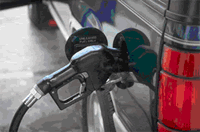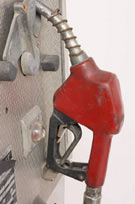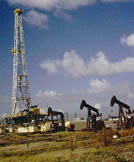|
The only good thing we can say about high gasoline prices is that it seems to have discouraged our precocious 6-year-old from developing his idea for a "super-turbo-charged
 rocket wagon." That aside, high gas prices are a touchy issue and, for many, are putting a crimp in our pocketbooks. Politicians, who are never shy about trying to capitalize on an issue that appears to be important to voters, are speaking up with ideas about who is to blame for the high prices and what should be done about it. Unfortunately, neither side of the political aisle is presenting a very accurate portrayal of the facts, and their ideas, which may be rhetorically pleasing to each of their voter bases, are insufficient to address the real cause of more of our hard-earned dollars being lost to the gas pump. Let's go through the issues.
rocket wagon." That aside, high gas prices are a touchy issue and, for many, are putting a crimp in our pocketbooks. Politicians, who are never shy about trying to capitalize on an issue that appears to be important to voters, are speaking up with ideas about who is to blame for the high prices and what should be done about it. Unfortunately, neither side of the political aisle is presenting a very accurate portrayal of the facts, and their ideas, which may be rhetorically pleasing to each of their voter bases, are insufficient to address the real cause of more of our hard-earned dollars being lost to the gas pump. Let's go through the issues.
If you adjust for inflation, today's gas prices are not low, but they are not extraordinarily high. InflationData.com points out that today's gasoline prices are right at the previous inflation-adjusted 1980 peak of $3.06 (in 2007 dollars). We can also be comforted by the fact that we're not sitting in three-hour-long lines to get gasoline, as many in the US did during the oil "crisis" of the late 1970s. Finally,
 Americans typically have more disposable income today than in the past. Annual gasoline bills are a lower portion of most people's household bills now, and swings in gas prices are less of a pocketbook shock.
Americans typically have more disposable income today than in the past. Annual gasoline bills are a lower portion of most people's household bills now, and swings in gas prices are less of a pocketbook shock.
Of course, these factors are little comfort as we watch the numbers on the gas pump spin faster than the lemons and cherries on a Vegas slot machine, but they're important reminders that can help us keep our high-octane outrage in check. Still, there ARE relevant issues about high gas prices that should be discussed.
The total amount we spend on gasoline is related to three main factors:
- the price at the pump;
- our vehicle's miles per gallon;
- the amount we drive.
We've already talked about factor number one. As for vehicle fuel economy, this is a critical factor in our ability to tolerate high gas prices. Imagine that your vehicle suddenly gets 40% better mileage than it does now. That would logically translate into a reduction of your yearly gasoline bill by the same percentage. That could put hundreds of dollars back in your pocket each year.
But we haven't been doing well lately on improving fleet-wide fuel economy. After impressive gains in the 1980s, progress essentially stopped. Today, the average passenger vehicle gets worse mileage than in 1980. We need a new, higher Corporate Average Fuel Economy (CAFE) standard. It's time to put ALL passenger vehicles into a single category; i.e. we should eliminate the separate category for light trucks. That doesn't mean trucks, SUVs, and minivans would suddenly have to get the same mileage as subcompacts;
 it just means that each auto manufacturer would have one target number to meet for the average fuel efficiency of their fleet. Larger vehicles that get fewer miles per gallon could still be counterbalanced by sales of higher mileage vehicles. Additionally, studies (PDF) have shown that auto manufacturers could significantly improve the fuel economy (and safety) of trucks and SUVs using existing technology.
it just means that each auto manufacturer would have one target number to meet for the average fuel efficiency of their fleet. Larger vehicles that get fewer miles per gallon could still be counterbalanced by sales of higher mileage vehicles. Additionally, studies (PDF) have shown that auto manufacturers could significantly improve the fuel economy (and safety) of trucks and SUVs using existing technology.
The federal government and many states have instituted tax incentives to encourage people to buy ultra-high-mileage vehicles, and that's great, but such programs are no substitute for a higher CAFE standard for the fleet. Auto manufacturers and some politicians are wont to claim that requiring further improving vehicles' fuel economy will make it impossible for consumers to get the vehicles they want. That's nonsense—it's no more true today than it was when they said it prior to fuel-efficiency standards being enacted in 1975.
On to factor number 3—the amount we drive. The causes of suburban sprawl and the reasons people are driving more miles today are too numerous and complicated to discuss here. But it's at least worth recognizing that many people are choosing to accept longer commutes so they can have the homes and jobs they want, and they're driving more miles to pursue leisure and other optional activities, too. These choices contribute to their higher gasoline outlays. But as with many other facets of household spending, we usually have the ability to make choices regarding the where, when, and how often of our driving, and that can help reduce our gas bills.

Every election season promises to have prominent discussions about energy issues. Here are a few of the ideas you're likely to hear politicians offering to reduce consumer's exposure to high gasoline prices and to address the looming liquid-fuels shortfall—and our quick take on them. (For a more complete discussion of energy issues, see our articles Peak Oil and Environment and Peak Oil Solutions.)
- More domestic oil production — Good luck with that. The US uses 1/4 of world oil production but has only 2% of its oil reserves. Drilling in ANWR, off-shore drilling, and deep-water drilling—which would all no doubt be implemented with inadvisable subsidies and environmental rollbacks—could all add marginal amounts of domestic oil production, but not enough to even meet the annual increase in demand.
- More imports from Canadian tar sands — Canada's production of oil from tar sands—which they have a LOT of—will continue to ramp up but will be limited by the high energy and water inputs needed for processing as well as limits to the Canadian people's tolerance for the very dirty mining and production schemes needed to turn tar sands into oil.
- US oil shale — Nope. Not gonna work. To find out why, read our article about oil shale problems.
- Ethanol — Increasing the use of corn to make ethanol fuel will worsen industrial-agriculture problems—which are already bad—and it will increase food prices. Cellulosic ethanol, if they can get it to work at all, will lead us into a new Dust Bowl era. Ethanol is mostly a subsidy for US agribusiness.
- Hybrids — Right on. More gasoline-electric or diesel-electric hybrids are a good idea, as long as the extra efficiency is being put into high mileage, not greater vroom. The real goal should be plug-in hybrids. We should be pouring billions into the research and infrastructure necessary to make plug-in hybrids a reality.
- Hydrogen and fuel cells — There are MAJOR technological hurdles here. It's not gonna happen in the near term, and it's not obvious that the energy-conversion-and-loss problems with hydrogen can be overcome at all.
- Higher fuel economy standards — This is a must. All new cars and trucks should be held to an average of 40 MPG by 2015, with intermediate milestones required between now and then. Ignore the whining of the car companies. It's insanity that we have waited so long to do this.
- Twist OPEC's arm to increase production — We are at or near the historic peak in petroleum production. We will have less petroleum available in the future, whether we beat up on OPEC countries or not.
- Coal to Liquids — Even the cleanest version of this is a greenhouse-gas loser, and coal mining is dirty business regardless of how you process the coal.
- Wood to Liquids — No, thanks. This would be a perfect way to lose our remaining forest cover.
- Mass transit — Absolutely. We should be rebuilding our freight and passenger rail systems, expanding subway systems in major metropolitan areas, reinstating trolley systems, and reinvigorating bus service. Right now, such initiatives all no doubt seem yawn-worthy to the car-happy masses, but they will seem eminently sensible when gas prices hit $6.00 per gallon and gas lines come back—which they will.
It's reasonable to think that our outlays for gasoline should be addressed by our politicians. We'll be listening carefully to our current leaders and wanna-be leaders to see who speaks most directly to the real energy solutions that will help us mitigate the effects of high gasoline prices—and gas shortages—in the future.
Addressing our long-term transportation challenges may not do much to ease our short-term pain at the pump, but our politicians should lead us by telling us the truth about the nature of our problems and the necessary solutions. We hope they won't simply offer political rhetoric and feel-good non-solutions.
So, here's hoping that the next time we pull the lever in the voting booth, we don't come up with all lemons!
Know someone who might like this article about High Gasoline Prices? Please forward it to them.
Books:
- See books related to 'High Gasoline Prices'
Related resources and article:
More articles and resources on....
Get Grinning Planet free via email
|


